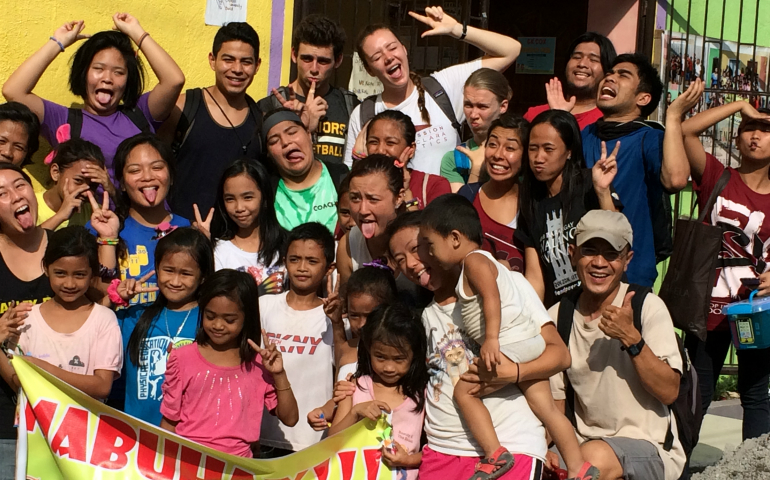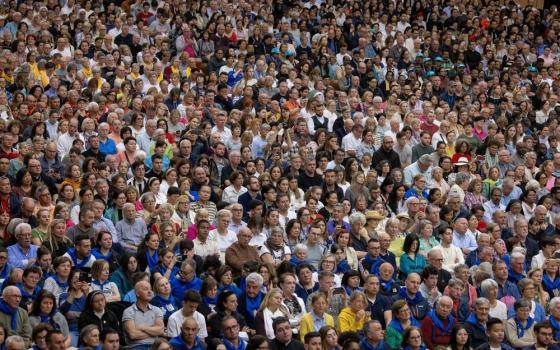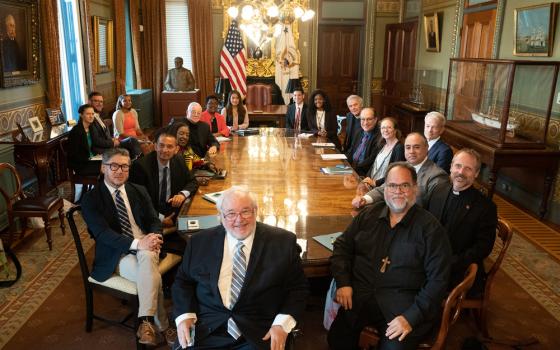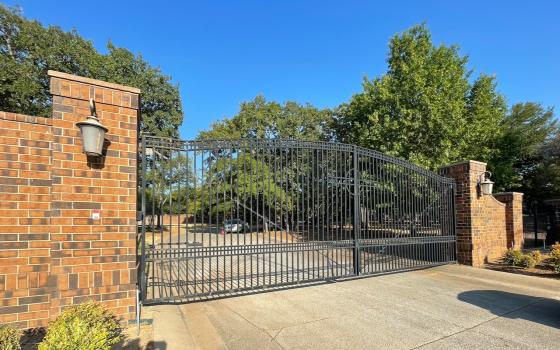
Santa Clara University Christian Life Community members on an immersion trip in the Philippines. (Provided photo)
At a time when millennials are abandoning organized religion, Jesuit Fr. Manh Tran has been a spiritual pied piper attracting hundreds of college students to Christian Life Community, also known as CLC. He was introduced to the program by students at Loyola Marymount University in Los Angeles and now he is director of Christian Life Community at Santa Clara University.
"Before I went to LMU, I did not know much about CLC," he recalls. "I had heard about it, but I had no idea what it meant. But imagine coming to the campus and seeing the 400 college students excited about God. I was thinking, 'Are they nuts?' I could not understand how these young college students were so excited about God. So I joined the group. I led the freshman group and journeyed with them for four years."
"It's basically helping a college student to explore and discover their faith, their vocation, and have a community supporting them," he said. "I kind of fell in love with it."
According to Tran, CLC attracts a wide range of believers and even some nonbelievers. At Santa Clara University about 75 percent of the 250 CLC members are Catholic, around 20 percent are Protestant of all spectrums, and 5 or 10 percent are Muslims, agnostics, or "nones."
Students are attracted by what Tran refers to as the three pillars of CLC: community, spirituality and service.
"I've been working in a Jesuit university for 11 years," he reports. "One thing I hear over and over again, they're looking for community."
"I could see the power of CLC, especially with the first- year students," continues Tran. "They're so lost and confused about how to fit in."
But there are lots of communities available on college campuses — sports teams, fraternities, sororities, academic clubs, service projects, etc. "So the question is what does CLC offer that's different?" he asks.
Here the second pillar, spirituality, is important. "I would have to say that what's unique about CLC definitely has to do with faith. The faith in the God that we try to introduce to them is the God who's active and attractive. It's not just doctrine, but a God that is active in their lives."
It is an open faith. "We provide the space and opportunities for people to dare to ask questions," Tran explains. "Some members have told me, 'I'm Catholic, but now I don't know what I believe in." ' That is okay for Tran. "It definitely creates space for people to just explore their faith."
"They find that Catholic faith is very attractive in many ways, especially with community support and with the rituals, with the retreat experience and with the service," but "they struggle to make sense of some of the issues that the Catholic church teaches like gay marriage or women priesthood or birth control."
They also tell Tran "that it's a struggle to live out their faith when they also encounter the college life that is opposite of their values and faith beliefs, ranging from the party culture to where do you stand on X, Y and Z political issues."
"For the first year and second year students, the primary reason to join is community," explains Tran. For them, it is just "I just want to have a community to support me."
"But with juniors and seniors, if they join, most of them join because they hunger for something else that other communities don't offer, namely something to do with faith. They have heard that we offer something about Ignatian spirituality and vocation discernment."
Vocational discernment is a key spiritual quest attracting students to CLC. "All college students hunger for 'what do I want to do with my life?'" says Tran. "What will I major in? What career path should I take? Ignatian spirituality provides for that. We have such a powerful resource for discernment."
For Tran, discernment is "about what gets you up in the morning? What excites you? What gives you life? What gives you joy?" That is what St. Ignatius Loyola called consolation, whereas "what pulls you away from life, from God, and from being your truest self — that's desolation. CLC provides support, provides students an opportunity to explore their faith and grow in their faith and vocation. That's what's unique and radical about CLC."
Discernment can help students pick a major and a life's work, sometimes a career, that serves others and is not as financially rewarding as other jobs.
"CLC is a way of living out God's dreams for us," explains Tran. "This is what it means to follow Jesus Christ: To support one another, to grow in faith, and to help the poor, love God, love neighbor, and lastly, love yourself."
Service is the third pillar of CLC, which asks its members to do 20 hours of community service per year.
A variety of service experiences are provided for students by CLC and the university, everything from tutoring to helping abused women and visiting the homeless. One project included an immersion trip to the Philippines.
Sometimes the service aspect of CLC is what attracts students to it.
"I had one student tell me that she had joined a sorority and then one of the CLC members invited her to help out with a service," reports Tran. "She doesn't believe in God; she doesn't believe anything. She considers herself as 'none.' But she said that there's something about this community that's different. At first she had a hard time articulating it, and then eventually she began to notice that what's unique about this community is the community is more outward — we do things for other people — whereas the sorority is more inward, just about me, myself, and appearances."
A lot people join CLC because of their friends — people invite them. Others have experience of a retreat in a Jesuit or Catholic high school. "Small group experience — they just want to experience that and they hunger for those small group experiences and CLC provides that," explains Tran. "Or because they heard that CLC provides service opportunities that they want to explore. So CLC basically attracts all spectrums."
Once attracted to CLC, the students are introduced to the Ignatian Examen, usually by student leaders who have been specially trained. "To me that's the most powerful and effective way," explains Tran. "If it makes sense to the student leaders, then they can do that."
This is often done on a CLC retreat in three meetings of guided reflection in large and small groups.
"The first meeting is just spending time with God and asking what gives you life, what gives you joy, and what helps you get closer to God?" said Tran. "We focus a lot on gratitude."
"At the second meeting, we focus a lot on desolation," he continued. "What pulls you away from God?"
"The third meeting is about planning your day, the next day with God."
Besides retreats, CLC members get together for fun and community building. "We have barbecues, bonfires, line dancing, and casino night," Tran explained. "The casino night is our annual fundraising event for Luther Burbank School, the school where we tutor."
They also meet for spiritual activities, like prayer services (including Taizé prayer), Eucharistic Adoration every other week, Stations of the Cross during Lent, a talk by the local bishop, etc. A variety of activities are offered to fit the interests and needs of different students.
When the students meet once a week, they are led by student leaders with the meetings focused on the three pillars: Community, spirituality, and service.
"The first-year track tends to be more on relationships and community — very basic stuff like what type of community are you looking for?" says Tran. "We talk about friendship; we talk about your relationship with your family."
"Then with spirituality, we talk about how did you experience God in the past, and how do you pray, what's your image of God, and so on," he continues. "With the service pillar, we talk about have you ever done any service and would you like to explore that. And if you have done it, when you help other people, how does that make you feel?"
The emphasis varies by year. "Freshmen focus on community and human relationships. With the sophomore groups, we emphasize much more faith exploration — who am I, who is God for me, and what gets me up in the morning? Juniors and seniors focus on relationships with other people, especially the world, the poor, and what gives your life meaning and all that."
Those who stay with CLC for four years conclude with a retreat based on the Spiritual Exercises of St. Ignatius.
Fr. Tran is often asked by students and others how to start a CLC on their campuses. "The best way is to just bring a group of friends, four or five friends and get together once a week just to pray and talk about what's going on in your lives," he explains. "Then after that first group, as you multiply, those students will become leaders and then they will go and form other small groups."
Students from Jesuit and Catholic high schools are usually good prospects. All you have to do, according to Tran, is say, "Hey guys, have you gone on a Kairos retreat or any retreat in your life? Have you experienced small groups? Please consider joining CLC."
Once they come in on an information night, then you say, "You know what? Besides small groups we offer much more. This is a way in a community that we try to live out the life that is radical but also meaningful, and we follow Jesus and this is the way to fulfill God's dream for us."
Tran has developed resources for CLC meeting, which are available on the web.
Tran himself came to this ministry in a roundabout way. He left Vietnam in 1980 when he was only 14 as a refugee. "We encountered pirates four times, five days on the ocean without food, without water," he recalls. "The escape was a turning point for me, asking a lot of questions about why God allows people to suffer."
In a Thai refugee camp, he met his first Jesuit, Fr. Joseph Devlin. "I heard that he was a Jesuit, but I had no idea what that meant. All I knew was that he was here to help us. It never crossed my mind about being a Jesuit, but in the back of my mind, I always felt like I wanted to do something like helping the poor and daydreamed about becoming a priest or a teacher."
But after college he went to work for an accounting firm. "I was seduced by the money and said, 'Forget about teaching." ' For a while, he convinced himself, this is the good life, "but there was something in me; I always felt restless, like is this it?" In 1991, he visited Vietnam for the first time since he had left, and it reawakened his dream.
Back in the U.S., "one day I went to church and I heard an announcement: 'There's an Ignatian retreat this weekend. Anyone want to sign up?' So I signed up. It was the first time I ever heard about Ignatian retreats." It was another turning point in his life and led him to eventually become a Jesuit.
Because of his own experience with Ignatian retreats and his work with CLC, he thinks that Ignatian spirituality should receive greater stress in Jesuit ministries.
"I feel we are so focused on intellectual apostolate and social justice — which I think is beautiful and great," he explains. "We don't promote enough about the spiritual exercise and Ignatian spirituality."
"We're so focused on intellectual apostolate and social justice," he repeats, that "many students that I encounter have no idea what Ignatian spirituality is. I mean they heard about it, but they have no idea what that means. So I would love us to do a bit more integrating the spirituality in all aspects of the Jesuit universities, and CLC is just one way of doing that."
[Jesuit Fr. Thomas Reese is a senior analyst for NCR and author of Inside the Vatican: The Politics and Organization of the Catholic Church. His email address is treesesj@ncronline.org.]
Editor's note: We can send you an email alert every time Thomas Reese's column, Faith and Justice, is posted. Go to this page and follow directions: Email alert sign-up.







